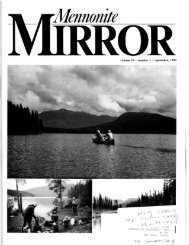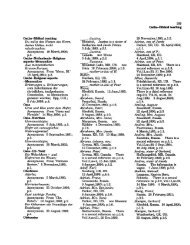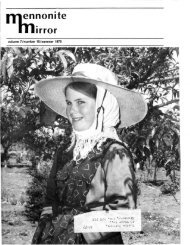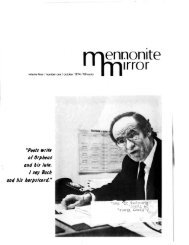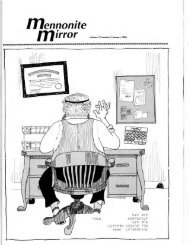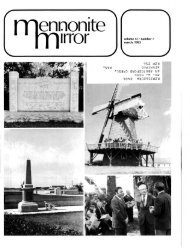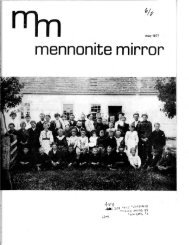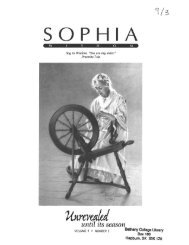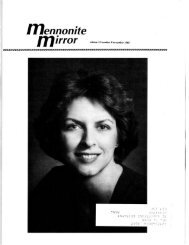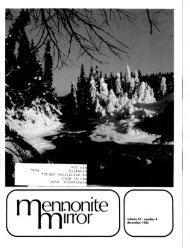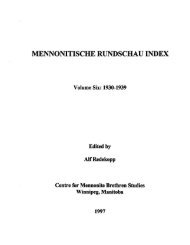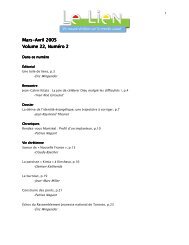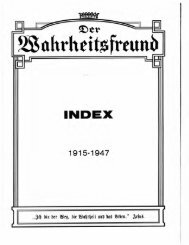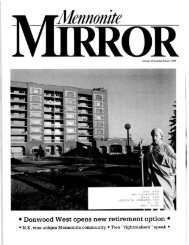enoo te - Canadian Conference of Mennonite Brethren Churches
enoo te - Canadian Conference of Mennonite Brethren Churches
enoo te - Canadian Conference of Mennonite Brethren Churches
You also want an ePaper? Increase the reach of your titles
YUMPU automatically turns print PDFs into web optimized ePapers that Google loves.
further expec<strong>te</strong>d that the ra<strong>te</strong> <strong>of</strong> mixed<br />
marriages would have increased considerably<br />
during this period <strong>of</strong> time and<br />
suspec<strong>te</strong>d that there might be a correlation<br />
between the ra<strong>te</strong> <strong>of</strong> mixed marriages<br />
and the ra<strong>te</strong> <strong>of</strong> divorce.<br />
The final results <strong>of</strong> our study did not<br />
wholly confirm our original hypotheses.<br />
There was a marked increase in the<br />
number <strong>of</strong> mixed marriages. In 1946,<br />
out <strong>of</strong> a total <strong>of</strong> 99 marriages, six are<br />
mixed marriages. In 1956, the total<br />
number <strong>of</strong> marriages is 202, the number<br />
<strong>of</strong> mixed marriages seven. In 1966, there<br />
are 33 mixed marriages out <strong>of</strong> a total <strong>of</strong><br />
263 marriages. In 1976, 84 <strong>of</strong> the total<br />
313 marriages are mixed marriages. The<br />
percentage <strong>of</strong> mixed marriages to total<br />
marriages is approxima<strong>te</strong>ly six percent<br />
in 1946, 3.6 percent in 1956, 14 percent<br />
in 1966, and 37 percent in 1976.<br />
The variation between 1946 and 1956<br />
is probably insignificant because <strong>of</strong> the<br />
relatively small sample available for the<br />
earlier year. It should also be no<strong>te</strong>d that<br />
not all <strong>of</strong> the churches involved in the<br />
study could supply records for 1946. But<br />
the increase between Hl46 and 1976 is<br />
significant. By 1976, over a third <strong>of</strong> the<br />
marriages performed in Manitoba Mennoni<strong>te</strong><br />
churches were between Mennoni<strong>te</strong>s<br />
and non-Mennoni<strong>te</strong>s.<br />
The divorce ra<strong>te</strong>s, however, did not<br />
conform as clearly to expectation.<br />
Among the couples married in 1946, we<br />
no<strong>te</strong>d 1 divorce; in 1956, two divorces;in<br />
1966, eight divorces; and in 1976, eight<br />
divorces. In <strong>te</strong>rms <strong>of</strong> percentages approxima<strong>te</strong>ly<br />
one percent <strong>of</strong> the marriages<br />
contrac<strong>te</strong>d in 1946 and 1956 ended<br />
in divorce. For 1966 and 1976, the<br />
figure approaches three percent.<br />
The statistics we compiled did not<br />
generally indica<strong>te</strong> a relationship between<br />
mixed marriages and divorces.<br />
There were a total <strong>of</strong> 19 divorces in all<br />
four years. Of these, seven were mixed<br />
marriages. This would make the percentage<br />
<strong>of</strong> the divorces among the mixed<br />
marriages <strong>of</strong> the sample years approxima<strong>te</strong>ly<br />
5.4 percent. Again, however, the<br />
comparatively small sample <strong>of</strong> mixed<br />
marriages-130 out <strong>of</strong> a total sample <strong>of</strong><br />
877-makes this result inconclusive.<br />
Observations and reflections<br />
The major result <strong>of</strong> our study is the<br />
finding that the divorce ra<strong>te</strong> among<br />
Mennoni<strong>te</strong>s remains low even in 1966<br />
and 1976. There is one proviso, <strong>of</strong><br />
course, which should be kept in mind<br />
when reading the 1976 figures. These<br />
marriages have had a life <strong>of</strong> only three<br />
years. There will in all likelihood be more<br />
divorces among this group <strong>of</strong> marriages<br />
during the coming years, although<br />
sociologists do <strong>te</strong>ll us that most divorces<br />
occur within the first years <strong>of</strong> marriage.<br />
While the number <strong>of</strong> divorces among<br />
Mennoni<strong>te</strong>s is clearly increasing, the in-<br />
81mennoni<strong>te</strong> mirror/january 1980<br />
crease between 1946 and 1976 is not as<br />
dramatic as was expec<strong>te</strong>d. This result is<br />
at once hopeful and sobering. It is obvious<br />
that marriage continues to be an<br />
important value in the Mennoni<strong>te</strong> community.<br />
A study <strong>of</strong> this kind, <strong>of</strong> course,<br />
cannot pre<strong>te</strong>nd to evalua<strong>te</strong> the quality <strong>of</strong><br />
the sample marriages. Without en<strong>te</strong>ring<br />
the deba<strong>te</strong> on whether divorce is valid or<br />
even desirable in some instances, it<br />
might simply be no<strong>te</strong>d that a grea<strong>te</strong>r<br />
percentage <strong>of</strong> Mennoni<strong>te</strong>s today seem to<br />
view separation and divorce as an available<br />
option.<br />
Perhaps · the most surprising consequence<br />
<strong>of</strong> our study, though, is the<br />
discovery that there is a considerable<br />
discrepancy between what we think is<br />
the case and what the figures show to be<br />
the case. Our supposition that the incidence<br />
<strong>of</strong> divorce among Mennoni<strong>te</strong>s<br />
had increased significantly in the last<br />
years was shared by many <strong>of</strong> the<br />
minis<strong>te</strong>rs contac<strong>te</strong>d for the study. We<br />
were repea<strong>te</strong>dly told in · conversation ·<br />
that, in their view, marital failure and<br />
family breakup were becoming serious<br />
problems in the community. Yet the<br />
number <strong>of</strong> divorces and separations in<br />
these same churches was usually very<br />
low.<br />
This discrepancy is partly accoun<strong>te</strong>d<br />
for by the notion <strong>of</strong> selective perception.<br />
Being human, we <strong>te</strong>nd to recall the few<br />
failed marriages we know and forget the<br />
. many successful ones.<br />
But there seens to be another factor<br />
operating here as well. I no<strong>te</strong>d at the<br />
beginning <strong>of</strong> this article that the problems<br />
<strong>of</strong> divorce and family failure are<br />
brought to our notice all the time. Particularly<br />
during the Year <strong>of</strong> the Child in<br />
1979, the discussions <strong>of</strong> the special problems<br />
<strong>of</strong> the child <strong>of</strong><strong>te</strong>n emphasized the<br />
relationship between broken homes and<br />
the increasing incidence <strong>of</strong> such things<br />
as juvenile delinquency and child abuse.<br />
It seems that we have assumed that<br />
what we are told is true <strong>of</strong> our society in<br />
general is true <strong>of</strong> our particular community<br />
as well. Mennoni<strong>te</strong>s are sometimes<br />
accused-and sometimes accuse each<br />
other-<strong>of</strong> lagging behind the times. In<br />
this case, we seem to be running ahead<br />
<strong>of</strong> ourselves.<br />
The danger is that thinking it is so<br />
may yet make it so. We are told so frequently<br />
<strong>of</strong> the prevalence <strong>of</strong> divorce in<br />
modern society that we begin to regard<br />
it as an irrevocable, and even commonplace,<br />
fact. Once we believe that a significant<br />
number <strong>of</strong> marriages will inevitably<br />
end in separation or divorce,<br />
the pressure to find other solutions to<br />
marital difficulties is dissipa<strong>te</strong>d.<br />
Divorce may be a fact <strong>of</strong> modern life.<br />
But for the Manitoba Mennoni<strong>te</strong> community,<br />
the fact is that each separation<br />
and divorce is still an unusual event.<br />
mm<br />
FOOD BANK<br />
FARMER'S AFRICA TOUR<br />
February 23 - March 19, 1980<br />
Group tour will visit<br />
5 African countries<br />
Price: $2550.<br />
For more information call<br />
Food Bank (1) (204) 475-3550<br />
or<br />
Assiniboine Travel<br />
(1) (204) 775-0271
Mr. AA. DeFehr transferring Presidency <strong>of</strong> his firm to his son Frank.<br />
A.A. DeFEHR EXPANDS<br />
AND CHANGES NAME<br />
As <strong>of</strong> this month, A.A. DeFehr Manufacturing<br />
<strong>of</strong> Winnipeg acquired a new<br />
corpora<strong>te</strong> identity as it reorganized itself<br />
into Palliser Furniture Limi<strong>te</strong>d. A short<br />
ceremony in November to open a new<br />
uphols<strong>te</strong>ry plant in Winnipeg also<br />
resul<strong>te</strong>d in an announcement <strong>of</strong> the new<br />
corpora<strong>te</strong> identity.<br />
In addition to the name changes the<br />
company made some changes in<br />
management positions: A.A. DeFehr<br />
retired as president and now becomes<br />
chairman <strong>of</strong> the board; Frank DeFehr <strong>of</strong><br />
Calgary is president; and Art DeFehr,<br />
vice-president. In addition Vic Schulz's<br />
role has been expanded as general<br />
marketing manager and is responsible<br />
for sales and product in all its divisions.<br />
A.A. DeFehr star<strong>te</strong>d the company in<br />
the basement <strong>of</strong> his home in North<br />
Kildonan in 1944. Nine<strong>te</strong>en years la<strong>te</strong>r<br />
and two moves, a new plant was built on<br />
Vulcan Avenue. At present the head<strong>of</strong>fice<br />
plant is the largest <strong>of</strong> six, employing<br />
290 people in 200,000 square feet.<br />
Under the reorganization the A.A.<br />
DeFehr plant becomes a division <strong>of</strong><br />
Palliser Furniture. Six other family businesses<br />
will also become divisions: Comfort,<br />
an uphols<strong>te</strong>ry plant in Winnipeg;<br />
Towne Hall, an uphols<strong>te</strong>ry plant in<br />
Calgary; Logic, a ready-to-assemble<br />
plant in Winnipeg; Rocky View a bedroom<br />
plant in Airdrie, Alberta; Palliser<br />
Sleep Products, a bedding plant in<br />
Alberta; and Palliser Transport.<br />
The Palliser name was chosen and<br />
pays tribu<strong>te</strong> to John Palliser an Irish explorer<br />
to the <strong>Canadian</strong> west, who<br />
organized the first wes<strong>te</strong>rn scientific<br />
exploration in 1857 with the backing <strong>of</strong><br />
the Royal Geographic Society.<br />
Winnipeg Bible College and Theological<br />
Seminary has appoin<strong>te</strong>d Dr.<br />
William R. Eichhorst as president <strong>of</strong> the<br />
College and Seminary. Eichhorst has<br />
been with the school since 1963 and<br />
replaces Dr. Kenneth G. Hanna, who<br />
s<strong>te</strong>pped down as president last April.<br />
Hanna plans to return to full-time<br />
<strong>te</strong>aching in both the college and<br />
seminary. Dr. Eichhorst, Th.D., a native<br />
<strong>of</strong> Yorkton, Saskatchewan, received his<br />
formal theological training at Dallas<br />
Theological Seminary, Dallas, Texas,<br />
and at Grace Theological Seminary,<br />
Winona Lake, Indiana. The Eichhorsts<br />
live on the Ot<strong>te</strong>rburne campus and are<br />
members <strong>of</strong> Bethesda church, Winnipeg.<br />
Lillian Toews <strong>of</strong> Morris, who restores<br />
and makes violins in her spare time<br />
raises the sensitivities <strong>of</strong> some males<br />
who wonder what she is doing in their<br />
realm <strong>of</strong> instrument-making. She also<br />
defied the doubtful truism that successful<br />
violin training cannot begin af<strong>te</strong>r<br />
12 years <strong>of</strong> age. Morris-area children as<br />
well as Mrs. Toews and her children take<br />
weekly lessons from Emmanuel Horch<br />
in the Toews home. Mrs. Toews has comple<strong>te</strong>d<br />
a first violin in six months <strong>of</strong> constant<br />
labor, and has a violin which a<br />
Winnipeg violin craftsman considers<br />
much bet<strong>te</strong>r than his own first. In fact<br />
her violin has an estima<strong>te</strong>d value <strong>of</strong><br />
$1,000, in comparison to the 'averagepriced'<br />
$400 factory-produced Stradivarious<br />
copy. Mrs. Toews is encouraged<br />
in her efforts by her husband, Arthur, a<br />
<strong>te</strong>acher at Morris Collegia<strong>te</strong>. His special<br />
hobby is wood turning.<br />
Mr. and Mrs. John R. Friesen formerly<br />
<strong>of</strong> Kleefeld, celebra<strong>te</strong>d their 60th wedding<br />
anniversary on November 18. Mr.<br />
Friesen was for years a minis<strong>te</strong>r <strong>of</strong> the<br />
Kleefeld E.M. church. Mr. Friesen also<br />
was well-known for the busy thresher<br />
gang he took around the countryside<br />
before the advent <strong>of</strong> the combine spelt<br />
the departure <strong>of</strong> a certain way <strong>of</strong> life.<br />
A delegation <strong>of</strong> four visitors from<br />
Russia, Jakob Fast, Sergei Nikolaev,<br />
Traugott Quiring and Bernard Sawatsky,<br />
toured Mennoni<strong>te</strong> institutions and<br />
churches across Canada from October 31<br />
to November 20. Nikolaev, at a dinner<br />
duri.ng which they were presen<strong>te</strong>d with a<br />
plaque <strong>of</strong> the Lord's Supper, poin<strong>te</strong>d out<br />
that they had come as ambassadors <strong>of</strong><br />
Jesus Christ to build bridges <strong>of</strong> trust,<br />
love and fellowship.<br />
John Wieler, overseas director <strong>of</strong> MCC<br />
(Canada) was the keyno<strong>te</strong> speaker at the<br />
annual MCC (Manitoba) meeting at<strong>te</strong>nded<br />
by 400 delega<strong>te</strong>s and 250 guests at<br />
the Portage A venue MB Church. The<br />
focus was on the churches' need to be<br />
sensitive to refugees' needs.<br />
Freeman Junior College, a small Mennoni<strong>te</strong><br />
liberal arts college in Freeman,<br />
South Dakota, has experienced a spiritual<br />
renewal since the beginning <strong>of</strong> the<br />
current year with students and staff<br />
having a strong in<strong>te</strong>rest in Bible study,<br />
prayer and discipleship. The renewal<br />
arose from a series <strong>of</strong> meetings earlier in<br />
the year. Freeman is a two-year college<br />
<strong>of</strong>fering career programs in agribusiness,<br />
practical nursing, early childhood<br />
education, and secretarial/business.<br />
Cynthia Melanie Reimer received her<br />
call to the Alberta Bar this past fall in<br />
Edmonton. She articled with the firm <strong>of</strong><br />
D' Arcy Deacon in Winnipeg before moving<br />
to Edmonton to join the firm <strong>of</strong><br />
Berlins-Mather. She is currently in<br />
Calgary with the law firm Beaumont<br />
Proctor and Associa<strong>te</strong>s. She is the<br />
daugh<strong>te</strong>r <strong>of</strong> Dr. Al and Joan Reimer <strong>of</strong><br />
Winnipeg.<br />
mennoni<strong>te</strong> mirror/january 1980/13<br />
i<br />
I<br />
i!<br />
'[<br />
i<br />
ii,<br />
I<br />
,I'<br />
:r<br />
Ii!<br />
Ii:<br />
I:<br />
!
The Loewen esta<strong>te</strong><br />
"Voronaja" August, 1905<br />
by Al Reimer<br />
The following scene is taken from a<br />
novel-in-progress, and introduces the<br />
charac<strong>te</strong>r <strong>of</strong> Nestor Makhno, who would<br />
la<strong>te</strong>r during the Russian Civil War<br />
become a vicious anarchist leader whose<br />
<strong>te</strong>rrorist bands slaugh<strong>te</strong>red hundreds <strong>of</strong><br />
Mennoni<strong>te</strong>s. While the notorious career<br />
<strong>of</strong> this real-life butcher has been welldocumen<strong>te</strong>d,<br />
the incident dramatized<br />
here is <strong>of</strong> my own invention and, to my<br />
knowledge, never took place in real life,<br />
although Makhno is known to have<br />
worked for Mennoni<strong>te</strong> farmers as a<br />
youth.<br />
by Al Reimer<br />
Pain exploded from the welts on his<br />
buttocks and back as he tried to shift his<br />
body ever so slightly on the straw. He<br />
groaned s<strong>of</strong>tly, then cursed slowly and<br />
delibera<strong>te</strong>ly. Damned German . cockroach.<br />
Double-damned whip. He tried<br />
not to move in his rage; just lie motionless<br />
on his stomach. It was getting<br />
dusk in the barn l<strong>of</strong>t. The rumble in his<br />
gut told him it was suppertime. To hell<br />
with it! He would stay right here; he<br />
didn't need their slop, the rot<strong>te</strong>n<br />
bourgeois bloodsuckers.<br />
He writhed inwardly as he remembered<br />
how the big, thick Papasha<br />
Loewen with his red face and <strong>te</strong>rrible<br />
black mustache had stood over him with<br />
his whip and told him to put his arms<br />
around the rubbing post behind the cow<br />
barn.<br />
"I didn't know it was wrong to take<br />
the chisel, I didn't know," he had sobbed<br />
despera<strong>te</strong>ly. "I only took it along to try<br />
it out." He knew it was no use, but the<br />
pain, the horrible pain, he could already<br />
feel the <strong>te</strong>rrible bi<strong>te</strong> <strong>of</strong> the whip.<br />
"Then we'll have to <strong>te</strong>ach you that<br />
taking along what doesn't belong to you<br />
is s<strong>te</strong>aling, boy." The Papasha's calm<br />
voice cut through his sobs like s<strong>te</strong>el.<br />
Then it began. Just before the whip<br />
whistled he wan<strong>te</strong>d to cry, "Papasha,<br />
Little Uncle, don't hit, I won't take<br />
along anything anymore. I'm sorry,<br />
don't hit."<br />
But he wasn't able to get out the<br />
words before the first bi<strong>te</strong> <strong>of</strong> the whip<br />
spread unbearable fire through him. His<br />
agony was so great he wan<strong>te</strong>d only to<br />
faint, to pass out, but ins<strong>te</strong>ad he<br />
screamed and gasped and tried to slide<br />
141mennoni<strong>te</strong> mirrorljanuary 1980<br />
sideways to get away from the scalding<br />
blows. Time hung poised between blows.<br />
but the fire in his flesh leaped higher and<br />
higher until finally. mercifully, he lost<br />
the rhythm <strong>of</strong> strokes altogether as the<br />
burning became duller and subsided to<br />
throbbing numbness.<br />
He failed to perceive the second it<br />
stopped. He was in the dust, his thin<br />
body heaving with dry sobs. The<br />
Papasha was bending over him.<br />
breathing heavily.<br />
"All right, here's some salve. Get one<br />
<strong>of</strong> the boys to rub it on in the l<strong>of</strong>t. You<br />
can stay there or come down to supper.<br />
But remember, if you ever s<strong>te</strong>al anything<br />
again-anything at all-I'll send<br />
you home and you'll never work here<br />
again. Understood?"<br />
He stood up dazed, but he had under- .<br />
stood. At that moment, qui<strong>te</strong> unexpec<strong>te</strong>dly,<br />
the black hatred within him<br />
gave way to a sudden rush <strong>of</strong> <strong>te</strong>nderness<br />
that almost choked him. He didn't know<br />
why he felt like this. He didn't dare look<br />
up at the Papasha, but again he wan<strong>te</strong>d<br />
to say something and couldn't. He<br />
wan<strong>te</strong>d to say: "Papasha, you were right<br />
to beat me, I deserved it. You are my<br />
Papasha. my Little Father. and tmust<br />
feel your power ;hen I do wrong." But<br />
he just couldn't say the words.<br />
As he limped to the l<strong>of</strong>t, trying to<br />
fight down the pain, he knew that for the<br />
first time in his life he had felt what it<br />
was like to have a father. a father who<br />
cared enough to hurt him. Not the drunken<br />
sots <strong>of</strong> fathers he saw in his village,<br />
who methodically beat up everybody in<br />
the hut in their drunken fog. from wife<br />
to smallest baby. They were duraki,<br />
idiots. But a real father like this<br />
Papasha Loewen beat you when he was<br />
sober because you had done a bad thing.<br />
His <strong>te</strong>ars welled up again as he thought<br />
how unlucky he was not to have had<br />
such a father before. He had never had<br />
any father. not even a drink-crazed<br />
father,that he could remember. Only his<br />
mama and his brothers.<br />
By the time he had gingerly eased<br />
himself down on the straw in the l<strong>of</strong>t,<br />
the <strong>te</strong>nder feeling was gone. He was a<br />
fool to have felt that way even for a moment.<br />
To hell with a papasha. The big<br />
Loewen was nothing but an accursed<br />
land owner who had got<strong>te</strong>n rich by<br />
bleeding the peasant s. He had <strong>of</strong><strong>te</strong>n<br />
heard his older brothers cursing the sur-
se Babies enne Welt nejebrocht haude.<br />
"Etj sie nicht reed toum stauve"<br />
docht Tin. Oba kunn dise Sach nicht bet<br />
Ovend luhre? Se wud sijk jeeren bIos dol<br />
sat<strong>te</strong> en Meddach ae<strong>te</strong>. Jake haud noch<br />
niemols be so'ne schlach<strong>te</strong> Tiet jefroagt.<br />
Se tjickt .:am aun. Wo kunn ·he dao<br />
so jeduldich set<strong>te</strong>, he wisst doch daut<br />
Wiense veleicht spaziere kaume. Am<br />
sachet so earenst, von he jelacht haud,<br />
wud se sijk geoajat habe. Daut Hus wea<br />
Mus s<strong>te</strong>ll, auls auf daut Bejrafnis jef.<br />
Von de Groo<strong>te</strong>stov heade se de oule<br />
Klock. Von he ahr weinst aunbrelle<br />
wudd, dann kunn se sijk veleicht wehre,<br />
oba nu daut he so s<strong>te</strong>ll yea, haud se tjein<br />
Root. Kunn se am saje daut se sijk<br />
aengst? Na, daut musst he nicht wei<strong>te</strong>,<br />
se yea je aundasch doch gaunicht agnstlich.<br />
He haud ae foaken vetahlt, von<br />
Frulied de acht oda tiejen Tjinga en de<br />
Welt ne'jebrocht haude, en de leevde<br />
noch. Tin haud jedocht be so'ne besondre<br />
Tiet aus Tjast oda Doupfast wud<br />
eina doch waut gaunz Butajeweinlichet<br />
enwoahre. Ahr wea daut noch niemols<br />
jeworde. En de lats<strong>te</strong> Minut yea ae daut<br />
opp eimol aules gaunz ein oulent.<br />
Aere Marne haud jesagt, "Du motst<br />
die schetje, Tin."<br />
"Komm Jake," saed Tin."<br />
So vetahld miene Marne. Jleevst du<br />
daut? mm<br />
Kerr<br />
owned and<br />
managed since<br />
1887<br />
KERR'S<br />
FUNERAL<br />
CHAPEL<br />
120 ADELAIDE STREET<br />
WINNIPEG 2, MANITOBA<br />
CHAPEL OFFICE 943-6688<br />
_ x au<br />
Auch die Mennoni<strong>te</strong>n<br />
fangen an zu dich<strong>te</strong>n<br />
von Harry Loewen<br />
Der Kunst im Allgemeinen und der<br />
Prosa insbesondere standen die Mennoni<strong>te</strong>n<br />
von je her kritisch, <strong>of</strong>t sogar<br />
negativ, gegenueber. Fuer die Mennoni<strong>te</strong>n<br />
hat<strong>te</strong> es die Kunst, besonders<br />
die Malerei und Skulptur, mit Abgoet<strong>te</strong>rei<br />
zu tun. Got<strong>te</strong>s Gebot "Du sollst dir<br />
kein Bildnis noch irgend ein GIeichnis<br />
machen," wurde buchstaeblich verstanden<br />
und in manchen Faellen streng befolgt.<br />
Noch im 19. Jahrhundert wurde in<br />
Preussen ein mennonitischer Maler von<br />
der Gemeinde ausgeschlossen nur weil<br />
er Menschenportraets mal<strong>te</strong>. Auch<br />
Romane und Erzaehlungen wurden vielfach<br />
nicht gelesen, weil sie ja "nicht<br />
wahr" sondern nur "ausgedach<strong>te</strong> Geschich<strong>te</strong>n"<br />
waren.<br />
Heu<strong>te</strong> ist es im Allgemeinen anders<br />
geworden. Nicht nur sind viele Mennoni<strong>te</strong>n<br />
den verschiedenen Kuens<strong>te</strong>n<br />
freundlich gewogen, sondern sie haben<br />
auch fast auf allen Gebie<strong>te</strong>n Kuenstler<br />
zu verzeichnen: in der Prosa und Dichtung,<br />
im Drama, in der Musik natuerlich,<br />
und selbst in den bildenden Kuens<strong>te</strong>n.<br />
Eine Form der Dichtung ist den Mennoni<strong>te</strong>n<br />
immer schon nahe am Herzen<br />
gewesen, und das ist das Gedicht. Schon<br />
in Russland wurden die deutschen Klassiker<br />
gelesen, studiert, vorgetragen, und<br />
manchmal nachgeahmt. Besonders<br />
Dich<strong>te</strong>r wie Goethe, Schiller, Heine,<br />
Eichendol'ff und andere wurden den<br />
Mennoni<strong>te</strong>Q zu Lieblingen und Vorbildern.<br />
Wer kann<strong>te</strong> da nicht solche Versee<br />
wie "Fest gemauert in der Erden;"<br />
"Ueber allen Gipfeln ist Ruh," "lch<br />
weiss nicht, was solI es bedeu<strong>te</strong>n,"<br />
"Wem Gott'will rech<strong>te</strong> Gunst erweisen,"<br />
usw?<br />
Aucllschrieben die Mennoni<strong>te</strong>n Russlands<br />
selbst Gedich<strong>te</strong>. P.M. Friesen berich<strong>te</strong>t<br />
in seinem Geschichtsbuch von<br />
dem geschaetz<strong>te</strong>n Lehrer Heinrich<br />
Heese, und weist besonders darauf hin,<br />
dass dessen tief-religioeses Fuehlen und<br />
russischer Patriotismus in Gedich<strong>te</strong>n<br />
Ausdruck fanden. Und Berhard Harder,<br />
coder Reformator und Bussprediger,"<br />
wie P.M. Friesen ihn nennt, be sang in<br />
seinen vielen Gedich<strong>te</strong>n die schoene<br />
Natur, pries Gott und seine Gue<strong>te</strong>, und<br />
straf<strong>te</strong> das leichtfertige Leben der wohlhabenden<br />
Mennoni<strong>te</strong>n.<br />
Der mennonitische Dich<strong>te</strong>r Fritz<br />
Senn (Gerhard Friesen) erfreut noch<br />
heu<strong>te</strong> un sere Herzen mit seinen zahlreichen<br />
hoch- und plattdeutschen Gedich<strong>te</strong>n.<br />
Besonders .die Sehnsucht nach<br />
coder al<strong>te</strong>n HeimaC wird in seinen Gedich<strong>te</strong>n<br />
immer wieder wach.<br />
o Saenger, kannst du mir wohl sagen,<br />
Fuehrt denn kein Weg mehr heut<br />
Dorthin, wo einst "die stillen Doerfer<br />
lagen<br />
1m Mondschein hingestreut"?<br />
Aus der Verbannung haben wir viele<br />
Gedich<strong>te</strong>, die von Not, Gedult und GIauben<br />
der Tiefleidenden zeugen. Kurz vor<br />
seinem Tode im Jahre 1938, schrieb<br />
Prediger Aaron Toews in Gotjawino, Sibirien,<br />
die herzergreifenden Zeilen:<br />
Doch vor dem letz<strong>te</strong>n Schrit<strong>te</strong><br />
Hab' ich noch eine Bit<strong>te</strong>,<br />
Die, Heiland, nicht verschmaeh':<br />
"Dass ich doch meine Lieben,<br />
Die mir ja noch geblieben,<br />
Noch einmal wiederseh!<br />
Ein Gedicht hat eine grosse Wirkung<br />
auf den Menschen,. denn es kommt yom<br />
dich<strong>te</strong>rischen Herzen und geht beim<br />
Leser oder Hoerer desselben wieder zum<br />
Herzen. Warum? Nur zwei Gruende<br />
sollen hier kurz genannt werden.<br />
Einmal ein Gedicht verniag das auszudruecken,<br />
was <strong>of</strong>t nicht anders ausgedrueckt<br />
werden kann. Schmerzen und<br />
tiefes Leid kommen <strong>of</strong>t im Gedicht zur<br />
Sprache. Goethes leidender Dich<strong>te</strong>r,<br />
Tasso, sagt zu seinem Freunde Antonio:<br />
"Und wenn der Mensch in seiner Qual<br />
mennoni<strong>te</strong> mirror/january 1980/19<br />
I<br />
I<br />
I
verstummt, Gab mir ein Gott zu sagen,<br />
wie ich leide." Indem des Dich<strong>te</strong>rs Leiden<br />
im Gedicht zum Ausdruck kommen,<br />
lindert der Dich<strong>te</strong>r nicht nur seine<br />
eigene Not, sondern hilftauch dem, der<br />
ihn hoert oder liest.<br />
Zwei<strong>te</strong>ns, das Gedicht erinnert uns an<br />
eine bessere Welt, an das Paradies, sozusagen.<br />
1m Gedicht vernehmen wir<br />
Klaenge, Toene, und Ahnungen aus<br />
einer anderen, schoenen Welt, die uns<br />
entweder verloren gegangen oder vielleicht<br />
nie dagewesen ist. Es ist eine Welt<br />
nach der sich das menschliche Herz<br />
sehnt, und im Gedicht nimmt diese<br />
Sehnsucht Gestalt an. Abram J. Friesens<br />
Gedicht "Heimweh" drueckt solch<br />
eine Sehnsucht mit tiefem Gefuehl aus:<br />
Eure al<strong>te</strong>n frommen Lieder<br />
Von dem Kreuz, vor das ihr tre<strong>te</strong>t,<br />
Von dem Gott zu dem ihr be<strong>te</strong>t,<br />
Heu<strong>te</strong> hoer<strong>te</strong> ich sie wieder.<br />
Mich ergriff ein tief Verlangen,<br />
Waere durch vergessne Zei<strong>te</strong>n,<br />
Ueber fremde Laenderwei<strong>te</strong>n<br />
Gern zu euch zurueckgegangen.<br />
Das Verschwundne kehrt nicht wieder,<br />
Das Verlassne bleibt verloren.<br />
Doch mir klingen in den Ohren<br />
Immer noch die al<strong>te</strong>n Lieder.<br />
Neben den oben genann<strong>te</strong>n Dich<strong>te</strong>rn,<br />
waeren noch andere zu nennen, die in der<br />
deutschen Sprache dich<strong>te</strong>n. Pe<strong>te</strong>r J.<br />
Klassen, Gerhard H. Pe<strong>te</strong>rs, Nikolaus H.<br />
Unruh, J. William Dyck, Valentin<br />
Sawatzky, Hans Enns, urn nur einige zu<br />
nennen, haben in der deutsch-mennonitischen<br />
Dichtung Hervorragendes<br />
geleis<strong>te</strong>t. Eine ausgezeichne<strong>te</strong> Sammlung<br />
des deutschen Schrifttums der<br />
Mennoni<strong>te</strong>n in Canada, ist das von<br />
Georg Epp und Heinrich Wiebe herausgegebene<br />
Buch "Un<strong>te</strong>r dem Nordlicht"<br />
(1977). Die meis<strong>te</strong>n der in diesem Artikel<br />
zitier<strong>te</strong>n Gedich<strong>te</strong> sind aus diesem Buch<br />
entnommen worden.<br />
Dieser Artikel ist eine bearbei<strong>te</strong><strong>te</strong> Version<br />
von Pr<strong>of</strong>essor Harry Loewens Vortrag,<br />
den er am 10. November d. J. im<br />
Playhouse Theatre, Winnipeg, bei Gelegenheit<br />
eines Musikabends, dem am<br />
Mennonitischen Sprachverein veranstal<strong>te</strong>t<br />
wurde, hielt.<br />
Was ich ueber Westga<strong>te</strong><br />
denke<br />
von Andrea Krahn<br />
Westga<strong>te</strong> ist eine kleine Privatschule<br />
in Winnipeg, aber es ist eine gu<strong>te</strong><br />
Schule. Viele MenschEln haben viel Zeit<br />
und Geld fur diese Schule gegeben und<br />
dafuer bin ich dankbar.<br />
Ich denke, dass die Lehrer und<br />
Lehrerinnen sehr geduldig sind, und<br />
dass sie den Studen<strong>te</strong>n immer helfen<br />
wollen. Sie moech<strong>te</strong>n den StU:den<strong>te</strong>n<br />
helfen, aber sie wollen auch arbei<strong>te</strong>n. Die<br />
Lehrer und Lehrerinnen kennen aIle Studen<strong>te</strong>n.<br />
Es freut mich, wenn ein Lehrer<br />
mich begruesst und sich an mich erinnert.<br />
Ich liebe Westga<strong>te</strong> sehr. Es ist wie in<br />
einer grossen Familie. Man. kann aIle<br />
Kinder gut kennenlernen. Die Studen<strong>te</strong>n<br />
in meiner Klasse sind freundlich und<br />
respektvoll. Ueberall in Westga<strong>te</strong>, findet<br />
man eine freundliche Atmosphaere.<br />
Sport ist auch wichtig. Man kann in<br />
Volleyball, Korbball, oder Badminton<br />
spielen und auch Leichtathletik betreiben.<br />
Wir muessen schwer ueben, urn gut<br />
zu spielen. Letz<strong>te</strong>s J ahr gewann unser<br />
Volleyball-Team die meis<strong>te</strong>rschaft der<br />
"A" Klasse in Manitoba. Es war das<br />
ers<strong>te</strong> Mal, dass Westga<strong>te</strong> die meis<strong>te</strong>rschaft<br />
errang. Ich bin im Sport taetig;<br />
und es macht viel Spass und ich habe<br />
viel gelernt_<br />
In Westga<strong>te</strong> gibt es auch andere Taetigkei<strong>te</strong>n.<br />
Wir haben einen jaehrlichen<br />
201mennoni<strong>te</strong> mirrorljanuary 1980<br />
Schiausflug, eine Halloween Feier und<br />
ein Weihnachts-Bankett. Wir haben<br />
einen Arbeitstag und "Cyclathon", urn<br />
Geld fuer die Schule zu verdienen. Beide<br />
Choere tragen jedes Jahr eine Operet<strong>te</strong><br />
vor. AIle Studen<strong>te</strong>n nehmen an diesem<br />
Projekt <strong>te</strong>il.<br />
Westga<strong>te</strong> ist eine Schule mit<br />
Menschen, die dar an in<strong>te</strong>ressiert sind,<br />
anderen zu helfen. Letz<strong>te</strong>s Jahr war ich<br />
zwei Mona<strong>te</strong>lang krank. Ich habe viele<br />
Klassen versaeumt. Ich habe dreimal<br />
versucht, wieder in die Schule zu kommen.<br />
Es ging nicht. Die Lehrer und<br />
Lehrerinnen glaub<strong>te</strong>n, dass ich zu Hause<br />
bleiben soll<strong>te</strong>, urn mich auszuruhen. Sie<br />
sag<strong>te</strong>n, dass ich meine Schularbeit vergessen<br />
soll<strong>te</strong>. Zuerst soll<strong>te</strong> es mir besser<br />
gehen. Meine Freundinnen haben mich<br />
taeglich angerufen. Sie woll<strong>te</strong>n wissen,<br />
wie es mir ginge. Es freu<strong>te</strong> mich, dass<br />
viele Menschen an mich gedacht haben.<br />
1m Sep<strong>te</strong>mber, als die Schule wieder<br />
begann, frag<strong>te</strong>n viele Lehrer, wie es mir<br />
ginge.<br />
Westga<strong>te</strong> ist eine Mennonitische<br />
Schule. Wir lernen viel ueber unser Volk.<br />
Ich denke es ist in<strong>te</strong>ressant, dass man<br />
sich mit anderen Kindern von der<br />
gleichen . Religion un<strong>te</strong>rhal<strong>te</strong>n kann.<br />
Meine Schule spielt eine wichtige Rolle<br />
in meinem Leben.<br />
Andrea Krahn ist Studentin an der<br />
Westga<strong>te</strong> Schule.<br />
C __ '_Y_ou_r_w_o_r_d_)<br />
DISAGREE ON EDUCATION<br />
Dear Sir:<br />
In response to the two articles on .<br />
education in the November issue (No<br />
Easy Answer to How to Educa<strong>te</strong><br />
Children/Hiding The Light <strong>of</strong> Christianity<br />
in Christian Separa<strong>te</strong> Schools).<br />
Mrs. Dick seems to indica<strong>te</strong> that she<br />
would give other than Christian religious<br />
groups and individuals the same<br />
status <strong>of</strong> merit regarding their religious<br />
exercises as she would to "Christian<br />
religious exercises". This is denying the<br />
very words <strong>of</strong> Jesus when He said, "I<br />
am the way, the truth and the light, no<br />
man comes to the Father but by me" (In<br />
14:6).<br />
She also sta<strong>te</strong>s that a solution to this<br />
problem is to "come up with various<br />
non-religious models <strong>of</strong> decision<br />
making". There is no such a thing as a<br />
non-religious decision (atheism,<br />
secularism, humanism, ma<strong>te</strong>rialism,<br />
etc.) are all by proper definition, religions.<br />
In her article in a round about way she<br />
suggests that programs such as<br />
"Building the Pieces" have something<br />
in common with Christ and His<br />
followers. How absurd! She further<br />
sta<strong>te</strong>s that her opening sta<strong>te</strong>ment in her<br />
article (quoting Mary Ellen Doyle) is extreme<br />
and unfounded. On the contrary,<br />
it is not! Only those who are uninformed<br />
about what is really going on would consider<br />
that sta<strong>te</strong>ment extreme and unfounded.<br />
Mrs. Dick suggests that if you find a '<br />
book being used in school to be questionable,<br />
you should read the whole book<br />
"not just snippets". What ever for, if<br />
what I am objecting to is, the situations<br />
and language being used?<br />
In the Editorial, "Hiding the Light <strong>of</strong><br />
Christianity In Christian Separa<strong>te</strong><br />
Schools", the sta<strong>te</strong>ment is made that if<br />
students are isola<strong>te</strong>d in a separa<strong>te</strong> Christian<br />
school, upon graduation they are<br />
probably going to fail to survive because<br />
they won't be prepared. But you suggest<br />
that they can survive at a much younger<br />
age, getting into the same situation<br />
much earlier, in a public school. What<br />
logic!<br />
You endorse children using li<strong>te</strong>rature<br />
HOUSE FOR RENT:<br />
North Klidonan. In a quiet bay. o.er 1200 sq. ft. living<br />
spece. 3 large bedrooms, walk-In closet <strong>of</strong>t m.b.r.' Open<br />
IIreplace. Two baths, carpet<strong>te</strong>d, patio doorl, 'rldge,<br />
Ito.e, ... her & dryer. POlsessalon Feb. 1st. 5375 per<br />
mo. Calf 339-0323.
C __ O_ur_w_o_r_d __ )<br />
SIGNS OF A NEW MATURITY<br />
IN LOOKING AT OUR HERITAGE<br />
For <strong>Canadian</strong> Mennoni<strong>te</strong>s the past three decades have been<br />
the most momentous in their history. It was the period during<br />
which, for bet<strong>te</strong>r or for worse, we joined the "world" we had<br />
shunned for so long. There is now scarcely a business, a pr<strong>of</strong>ession,<br />
an art or a sport in which we are not successfully active.<br />
As a group we have achieved levels <strong>of</strong> success and prosperity<br />
never achieved before-not even in Russia. By embracing the<br />
dominant culture and making the transition to the English<br />
language, we have no doubt effec<strong>te</strong>d subtle changes in our<br />
ethnic psyche. What these changes will do to us as a people we<br />
do not yet know. But we can be sure that the process is irreversible,<br />
wha<strong>te</strong>ver it may bring. In this respect the new decade <strong>of</strong><br />
the eighties may prove to be the most crucial <strong>of</strong> all.<br />
One <strong>of</strong> the more positive signs <strong>of</strong> our new maturity and ethnic<br />
self-confidence is our growing in<strong>te</strong>rest in our heritage and past.<br />
Since the cen<strong>te</strong>nnial year <strong>of</strong> 1974 the trickle <strong>of</strong> Mennoni<strong>te</strong><br />
publications <strong>of</strong> all kinds-from history to fiction-has widened<br />
into a small flood. It is becoming difficult for Mennoni<strong>te</strong> papers<br />
and periodicals to review them all. We can also take pride in our<br />
fine new Heritage Centre at CMBC and in the exciting new<br />
Chair <strong>of</strong> Mennoni<strong>te</strong> Studies at the University <strong>of</strong> Winnipeg. In<br />
choral singing and music-making we are, <strong>of</strong> course, well-known<br />
in the community at large. Even such creative arts as fiction,<br />
painting and sculpture, which were traditionally viewed with<br />
suspicion, if not abhorence, as species <strong>of</strong> "graven images" and<br />
therefore idolatrous, are now winning acceptance as legitima<strong>te</strong><br />
expressions <strong>of</strong> Mennoni<strong>te</strong> culture (Harry Loewen, in his article<br />
on Mennoni<strong>te</strong> li<strong>te</strong>rature in the German section <strong>of</strong> this issue,<br />
makes the same point).<br />
While our ancestors were far less culture-conscious than we<br />
are, they did recognize the importance <strong>of</strong> preserving at least a<br />
rudimentary record <strong>of</strong> the past. Usually this took the form <strong>of</strong> a<br />
simple monument or cairn rather' than a fancy statue or painting.<br />
In f879, for example, a handsome monument to Menno<br />
Simons was erec<strong>te</strong>d in his home town <strong>of</strong> Witmarsum. In Russia<br />
an imposing cen<strong>te</strong>nnial obelisk, erec<strong>te</strong>d in 1889, graced the<br />
square in Khortitza until it was destroyed during the Civil War.<br />
In the ceme<strong>te</strong>ry on the island <strong>of</strong> Khortitza stood monuments<br />
dedica<strong>te</strong>d to Bartsch and Hoeppner, the scouts who arranged<br />
for the initial migration to Russia. Both <strong>of</strong> these monuments<br />
have been transplan<strong>te</strong>d to the Village Museum in S<strong>te</strong>inbach.<br />
There are other more modest monuments and markers in<br />
various places where Mennoni<strong>te</strong>s have lived. Soviet authorities,<br />
however, seem bent on obli<strong>te</strong>rating Mennoni<strong>te</strong> memorials. Most<br />
<strong>of</strong> the Mennoni<strong>te</strong> ceme<strong>te</strong>ries have been destroyed, their mortuary<br />
stones broken or used as foundation stones in Russian<br />
buildings.<br />
All the more welcome then is the project now under way to<br />
erect a monument on the grounds <strong>of</strong> the Manitoba Legislature<br />
221mennoni<strong>te</strong> mirro,.!january 1980<br />
to honor the memory <strong>of</strong> those thousands <strong>of</strong> Russian Mennoni<strong>te</strong><br />
martyrs who died for their faith and way <strong>of</strong> life, or who suffered<br />
long, anonymous years <strong>of</strong> imprisonment and perished far from<br />
home. They are the Unknown Mennoni<strong>te</strong>s who lie in unmarked<br />
graves.<br />
The commit<strong>te</strong>e in charge <strong>of</strong> this undertaking is envisaging a<br />
grani<strong>te</strong> obelisk nine feet high. Its four sides would bear metal<br />
pla<strong>te</strong>s depicting, respectively, grief-stricken women and<br />
children, men in chains, the trek into an unknown future and,<br />
fourthly, a brief verbal description. The commit<strong>te</strong>e is hopeful<br />
that permission will be gran<strong>te</strong>d to place the monument on the<br />
south side <strong>of</strong> the Legislative Building overlooking the Assini- .<br />
boine River.<br />
In order to stimula<strong>te</strong> in<strong>te</strong>rest in this worthwhile project, the<br />
commit<strong>te</strong>e has called for a general meeting in Winnipeg on<br />
February 18. Through its spokesman, Dr. Gerhard Lohrenz, the<br />
commit<strong>te</strong>e has declared itself open to suggestions and advice<br />
from in<strong>te</strong>res<strong>te</strong>d persons including, hopefully, the Mennoni<strong>te</strong> artists<br />
who are willing to dona<strong>te</strong> their skills.<br />
Mennoni<strong>te</strong> monuments have usually honored important<br />
founders, pioneers and beginnings. This new monument is<br />
dedica<strong>te</strong>d to the memory <strong>of</strong> ordinary people who were caught,<br />
through no fault <strong>of</strong> their own, in one <strong>of</strong> the most <strong>te</strong>rrifying and<br />
ruthless juggernauts <strong>of</strong> history the world has ever seen. In the<br />
lapidary dignity <strong>of</strong> grani<strong>te</strong> their memory will continue to live<br />
long af<strong>te</strong>r the petty bureaucrats and faceless tyrants who oppressed<br />
and murdered them have themselves sunk without a<br />
trace in the vast prison that is the Soviet Union.<br />
Our fellow French-<strong>Canadian</strong> citizens have their statue <strong>of</strong> a<br />
tormen<strong>te</strong>d Riel on the Legislative grounds, the Ukrainian <strong>Canadian</strong>s<br />
their massive, brooding Shevchenko. Fittingly, we Mennoni<strong>te</strong>s,<br />
although no longer "the quiet ones in the land," will<br />
have an unos<strong>te</strong>ntatious shaft <strong>of</strong> stone dedica<strong>te</strong>d to our peoplehood<br />
and Anabaptist faith, to the courageous martyrs who died<br />
dreaming <strong>of</strong> a free land that was not to be theirs, but which their<br />
loved ones and friends who survived have come to claim as their<br />
own.-AR<br />
H. Schmidt & Sons Ltd.<br />
MciVOR MALL, 1795 HENDERSON HWY.<br />
GENERAL INSURANCE<br />
LIFE INSURANCE<br />
OPEN EVENINGS & SATURDAY<br />
Telephone 339-2048
•<br />
Like Clockwork<br />
You call to have a shipment picked up. Soon, the Reimer Express driver<br />
arrives at your shipping room door. Your goods are on the way to another<br />
on-time delivery.<br />
It all seems as simple as <strong>te</strong>lling time. And it is - for you. But just as it<br />
takes a skilled craftsman to design a fine watch, so it takes people with<br />
years <strong>of</strong> experience to make a transport company run like clockwork.<br />
Reimer Express has the people with the necessary skills - and the equipment<br />
they need to get the job done.<br />
Put the skill and experience <strong>of</strong> Reimer Express to work for you. Call us<br />
when you want your shipments to destinations between the st. Lawrence<br />
and the Pacific moved like clockwork.<br />
We've got what it take.<br />
to take what you've got



